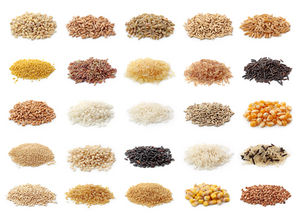Silicon
| See Also | Minerals |
|---|
Silicon is a mineral that is found abundantly on the earth. However, its exact biological role has not been discovered. We do know that it is involved in proper integrity of the skin, ligaments, tendons, and bones because it is required for the functioning of an enzyme known as prolyhydroxylase whose role is important for the formation of collagen in bone, cartilage, and other connective tissue. High amounts of silicon can also be found in calcifying areas of bone; the highest concentrations in the body are in the skin and hair [1].
Contents
Food Sources
The following foods have the highest concentration of silicon. For a more expansive list on food sources of specific nutrients visit Health Canada's Dietary Reference Intakes for Elements or USDA's National Nutrient Database
- Richest Sources: unrefined grains (such as oatmeal and brown rice) and root vegetables.
Uses
- To strengthen bones, connective tissue, hair and skin: In one study on a population of women with signs of aging hair, skin, and nails, a daily topical and oral dose of colloidal silicic acid showed positive results in terms of thickness of skin shown on ultrasound as well as strength of skin, wrinkle reduction, and improvements in hair and nail health.
Recommended Dosages
The recommended dosages varies based on age and health status. To determine what your specific requirements are talk to your naturopathic doctor or other trained medical professional.
There is no official RDA for silicon. A daily intake between 20-40mg is considered safe and probably adequate.
Deficiency Symptoms
There has been no demonstration of silicon deficiency in humans.
Prescribing Considerations
- Silicon is available in a variety of forms: silicon-rich horsetail (the plant Equisetum arvense), sodium metasilicate, and colloidal silicic acid. The colloidal form may be more beneficial as it can also be used topically but there is no real clear benefit to one over the others [1]
Safety
- Silicon is generally regarded as non-toxic; however, complexes of aluminum and silicon have been found in the neurofibrillary tangles and plaques in those individuals with Alzheimer's disease.
- Precautions: Those with renal calculi (kidney stones) should be cautious as reports of high doses of silicon, usually in the form of the antacid magnesium trisilicate, can cause siliceous renal calculi.
Drug Interactions
- Drug Interactions include: No known interactions have been found between silicon and any drugs [1]
References
- ↑ 1.0 1.1 1.2 Murray Michael T (2005) Encyclopedia of Nutritional Supplements, The Essential Guide for Improving Your Health Naturally, Prima Publishing
- ↑ Hendler Sheldon S, Rorvik David (Editors) (2008) PDR for Nutritional Supplements, Medical Economics Company Inc.
